Follow Your Different
208 The Power of Ethics with Bestselling Author Dr. Susan Liautaud
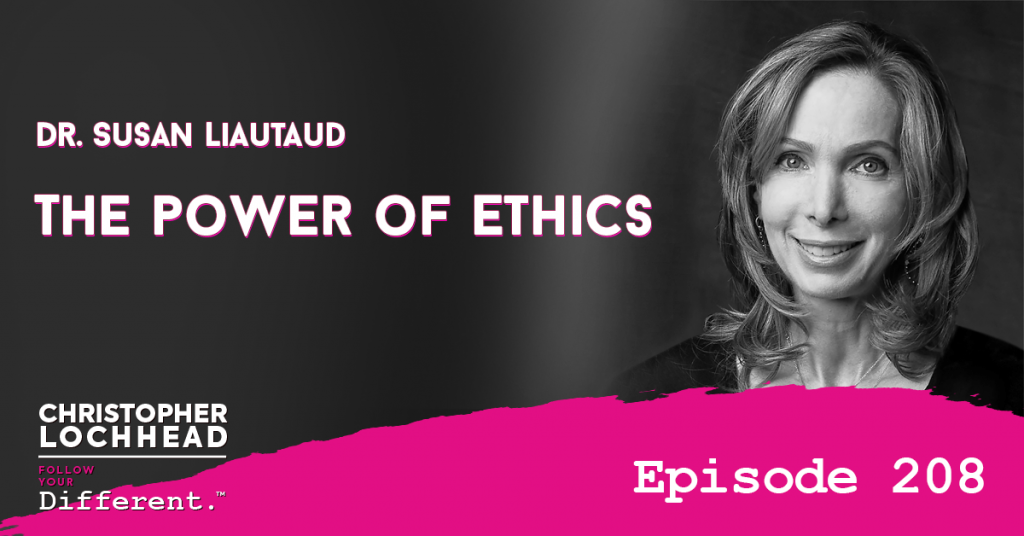
Podcast: Play in new window | Download (Duration: 1:33:05 — 63.9MB) | Embed
Subscribe: Apple Podcasts | Spotify | Pandora | RSS | More
Nowadays, people live at a time when discerning what’s right and wrong is getting more complex. As your choices can have profound, long term implications, it’s best to know where your moral compass lies.
In this episode of Follow Your Different, Dr. Susan Liautaud talks about Ethics and why it is more than just common sense. She explains why it matters more today, and how to apply an Ethics lens to critical areas of society. This is a fascinating conversation that will matter to anyone who cares about making the world a different place.
Dr. Susan Liautaud is the author of the new bestseller, The Power of Ethics: How to Make Good Choices in a Complicated World. She is an Ethics Advisor to major corporations and institutions, and also teaches Ethics at Stanford. She serves as Chair of the London School of Economics and Political Science Council.
Why Ethics is Not Common Sense
It used to be that people grew up on stories that gave examples of what’s right and wrong. Everything seemed black and white, and the lines in the sand were clear. In today’s world, where information is but a touch of a screen away, these lines have seemingly been blurred.
Dr. Susan Liautaud uses media platforms like Facebook or Twitter as examples for this. On one hand, it serves as a tool to connect people together and have lively conversations. On the other hand, there are some that use it to bully people and spread misinformation.
“In today’s world, you know, good and bad are all mixed. We are in this gray zone and things that can be used for the good like social media. Yet they can also be used for harm, like bullying on social media or spread of disinformation. So I think largely because the world has just gotten so complicated and technology and all the forces driving it aren’t really common sense for a lot of people.” – Dr. Susan Liautaud
The World is Changing so Fast
Christopher shares that for him, changing your opinion on something is not a bad thing. It means that you are open to new ideas and correcting your own.
“If you haven’t changed your mind lately, how do you know you have one?” – Christopher Lochhead
Dr. Susan agrees with this sentiment, and describes that Ethics can be the same way. The things we find ethical or otherwise can be flipped due to recent events or newly-available information. For her, it’s better to be in-the-know rather than to always stick with the old ways.
“I think one of the things about ethics that’s different today is that the world is changing so fast. The complexity I referred to earlier is evolving so quickly that we need to be monitoring, instead of holding our nose and leaping into a decision and being sure that we’re absolutely right. So I don’t call it flip flopping. I call it staying grounded in reality.” – Dr. Susan Liautaud
Finding Non-Binary Solutions
As more people get access to information and the lines between black and white get even more blurred, people’s definition of Ethics changes even further. For Dr. Susan, this is not a bad thing. Her main concern lies with people still looking for binary solutions to solve ethical problems.
Dr. Susan explains how people can get stuck behind a yes or no mindset for different situations, which limits their thinking to binary solutions. She elaborates further by using Christopher’s foil board example:
“What I would say is, can’t we find a solution that is non-binary, other than you can’t foil board on a public beach. Maybe you can foil board at certain times of day, in a place where there are only foil boarders who are willing to put themselves at that risk. We get ourselves into this Yes, No, black, white, one side of the wall or the other binary thinking, and we never get to seizing opportunity and mitigating risk.” – Dr. Susan Liautaud
To know more about Dr. Susan Liautaud and how Ethics is not common sense in some companies, download and listen to this episode.
Bio
Dr. Susan Liautaud teaches cutting-edge ethics at Stanford University and serves as Chair of the Council (trustees) at the London School of Economics and Political Science.
She advises corporations, NGOs, and governmental bodies and their leaders on internationally complex ethics matters and is the Founder of the Ethics Incubator.
Links
Follow Dr. Susan Liautaud here!
Linkedin: in/SusanLiautaudJDPHD
Twitter: @SusanLiautaud
Stanford profile: Dr. Susan Liautaud
Find out more about Dr. Susan Liautaud in these articles:
We hope you enjoyed this episode of Follow Your Different™! Christopher loves hearing from his listeners. Feel free to email him, connect on Facebook, Twitter, Instagram, and subscribe on iTunes!
206 Wild Rituals: Dr. Caitlin O’Connell of Harvard on Lessons Animals Teach Us About Connection, Community, and Ourselves
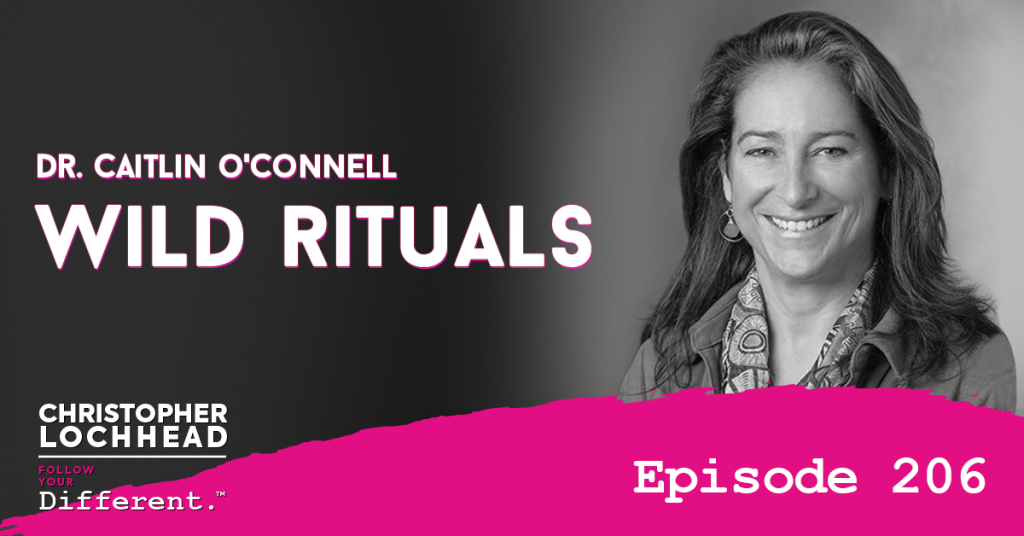
Podcast: Play in new window | Download (Duration: 1:12:25 — 49.7MB) | Embed
Subscribe: Apple Podcasts | Spotify | Pandora | RSS | More
In today’s episode of Follow Your Different, we are joined by Behavioral Ecologist and world-renowned Elephant Scientist, Dr. Caitlin O’Connell. She spent more than 30 years studying animals in their natural habitats. Dr. Caitlin has also taught at places like Stanford and Harvard.
She’s got a brand-new book out called Wild Rituals, where she explores 10 lessons animals can teach us about connection, community, and our own humanity. Her book comes out at a time in history when the human race is dealing with some pretty deep existential questions. Dr. O’Connell is here to help us deepen our understanding of ourselves by teaching us all about these legendary animals.
Taking Social Rituals for Granted
As the pandemic continues to keep everyone socially distant, people have started noticing social rituals and activities that we used to take for granted. Dr. Caitlin talks about the rituals in wild animal societies and how intense each social interaction was, even for something as simple as a greeting.
She further explains that in our current isolation, people have realized the importance of these rituals in our lives, no matter how basic it may have seemed.
“The reason I was inspired to write about rituals in wild animal societies was really just to remind us of how important ritual is in our own lives, and how similar our rituals are to other animals.” – Dr. Caitlin O’Connell
Different, But the Same
Dr. Caitlin discusses how we as a species have evolved, and how tools like language have accelerated our growth. Yet it is important to remember that everyone came from the same humble beginnings, but took different paths.
She reminds everyone we all evolved this need for ritual for the same purpose, despite the differences we display them.
“It’s easy for people to do that because we are the only species that evolved language. Then by that language, suddenly we just accelerated away from the branch on our evolutionary tree. But the thing to remember is that we all came from the same humble beginnings, whether or not we moved in another direction.” – Dr. Caitlin O’Connell
The Importance of Rituals
Dr. Caitlin and Christopher dive into the importance of social rituals, and why we cling to them almost instinctively. Dr. Caitlin shares that inclusion in such rituals makes us feel comfortable and connected.
“Well, rituals are very calming, they’re very soothing, they comfort us and, and make us feel connected. They, especially group rituals, when you’re doing something as a group, let’s say in a marching band or synchronized swimming, or singing with your friends to cheer your team on. They make you feel included and more bonded to the people that you’re with.” – Dr. Caitlin O’Connell
She also explains that as the population grew and society became more diverse, some social rituals have evolved to help identify each other from different groups. Yet as all of these group rituals help people feel bonded to the group, rituals can also lead down a dark path.
To know more about Dr. Caitlin O’Connell, as well as the dark path and how we can avoid it as social animals, download and listen to this episode.
Bio:
Dr. Caitlin O’Connell has been called a modern renaissance creative.
She is currently on the faculty at the Eaton Peabody Lab at Harvard Medical School studying elephant low-frequency hearing while also overseeing a non-profit foundation, (Utopia Scientific) promoting the importance of science and conservation.
Dr. Caitlin is an award-winning author and photographer and has been studying elephants in the wild for the last thirty years, having written dozens of scientific papers and numerous feature magazine articles and two memoirs about her experiences.
She taught creative science writing for Stanford and The New York Times and co-developed the award-winning Smithsonian documentary, Elephant King.
Dr. Caitlin is currently developing a new elephant docu-drama, Elephant Crown, and working on several feature movie and television scripts aimed at getting real science into popular media.
She has authored eight popular books about elephants, including an award-nominated thriller series about the ivory trade that is also being released as a graphic novel.
Links:
Website: Dr. Caitlin O’Connell’s Official Website
Amazon Books: Wild Rituals: 10 Lessons Animals Can Teach Us About Connection, Community, and Ourselves
Twitter: @Dr. Caitlin O’Connell
Instagram: @Dr. Caitlin O’Connell
Harvard links: @Dr. Caitlin O’Connell
We hope you enjoyed this episode of Follow Your Different™! Christopher loves hearing from his listeners. Feel free to email him, connect on Facebook, Twitter, Instagram, and subscribe on iTunes!
205 Legendary Author Dushka Zapata
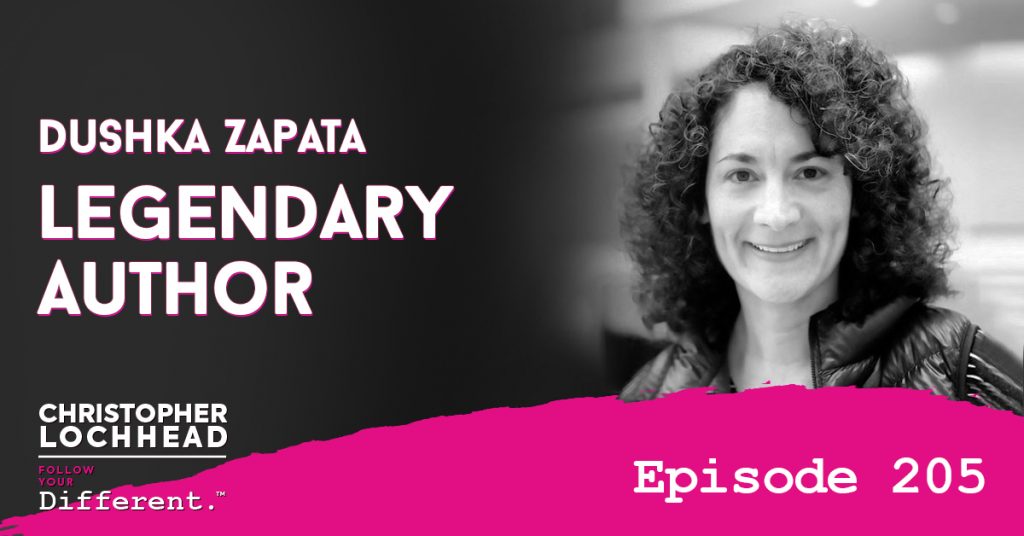
Podcast: Play in new window | Download (Duration: 48:41 — 33.4MB) | Embed
Subscribe: Apple Podcasts | Spotify | Pandora | RSS | More
In today’s episode of Follow Your Different, we are joined yet again by the breathtaking Dushka Zapata. Dushka is one of our regular guests in the podcast and one of the most important and prolific writers this world has to offer. The world truly needs more of Dushka.
Additionally, in an act of radical generosity, Dushka has decided to make all e-versions of her published books available on Amazon, for free, starting March 17, 2021. Everything she has published will be available in ebook form for free within a 24-hour period. We highly recommend going and check out the link and read her astounding books.
The Prioritization of Well-Being
The pandemic has changed everyone’s relationship landscape, and the glue that has held those relationships has modified its fundamental composition. Dushka discusses that the difficulty in prioritizing one’s well-being is due to the fact that oftentimes it is impossible to tell what exactly is the best for one’s well-being.
She shares that the only way to find the answer is to spend time alone, compassionately and gently, giving thought to what is genuinely best for oneself.
“We are all like boats and we all carry other people who take care of the maintenance of the boat. If the boat sinks, you are useless to others. So what is it that you need to do for the boat, which is you? You need to be functional for others.
The most responsible thing that we can do is to think about the best ways we can take care of ourselves.” – Dushka Zapata
The Pursuit of Happiness
Dushka discusses that her definition for the pursuit of happiness is less about being happy and more about the feeling of whether her actions have a sense of purpose. Most people are trapped in a constant state of sabotaging their own happiness because they feel like it’s too much. When in reality, there is no logical limit to how happy one can become.
She encourages people to never believe in mediocrity, low-grade despair, and to devise small steps to interests that bring one closer to happiness.
“There isn’t a higher being monitoring your amount of happiness. I think that if there were a first step, it would be to remove your own tendency to sabotage your own happiness.
If there were a second step, it would be about identifying the wants that are real.
And, if there were a third step, it would be about truly understanding what the difference is between the superficial want and the deeper wants.” – Dushka Zapata
The Architecture of One’s Fabrication
Dushka and Christopher discuss how life is just the story that people tell themselves about the facts, people live in the architecture of their own fabrication. Dushka shares how it is worthwhile to perceive oneself as the person who thinks their thoughts rather than being one’s thoughts. This guarantees a life not filled with suffering over things that are uncontrollable and non-existent.
“To me, a really central part about learning how to love myself has to do with making a distinction between the things I believe that are not true.” – Dushka Zapata
To know more about the legendary Dushka Zapata and how to prioritize your well-being, download and listen to this episode.
Bio:
After working for more than 20 years in the communications industry, Dushka noticed a theme.
People find it very difficult to articulate who they are and what they do.
This holds true for both companies and for individuals.
For companies, this is an impediment to the development of an identity, a reputation, a brand.
It makes it hard for customers to see how companies are different from their competitors.
For individuals, in a new world order of personal brands, it makes it hard to develop one that feels real.
This is the focus of Dushka’s work: she helps companies and people put into simple terms who they are, what they do, and where to go next.
Her work comes to life through message development, presentation training, media training and personal brand development.
It comes to life through executive coaching, workshops and public speaking.
It comes to life through what she writes.
Dushka has written ten bestseller.
Her work has been consumed on Q&A site Qoura 180M times.
Links:
We hope you enjoyed this episode of Follow Your Different™! Christopher loves hearing from his listeners. Feel free to email him, connect on Facebook, Twitter, Instagram, and subscribe on iTunes!
204 Equality Through Wealth w/ Teri Williams | President of Largest Black-Owned Bank in America OneUnited
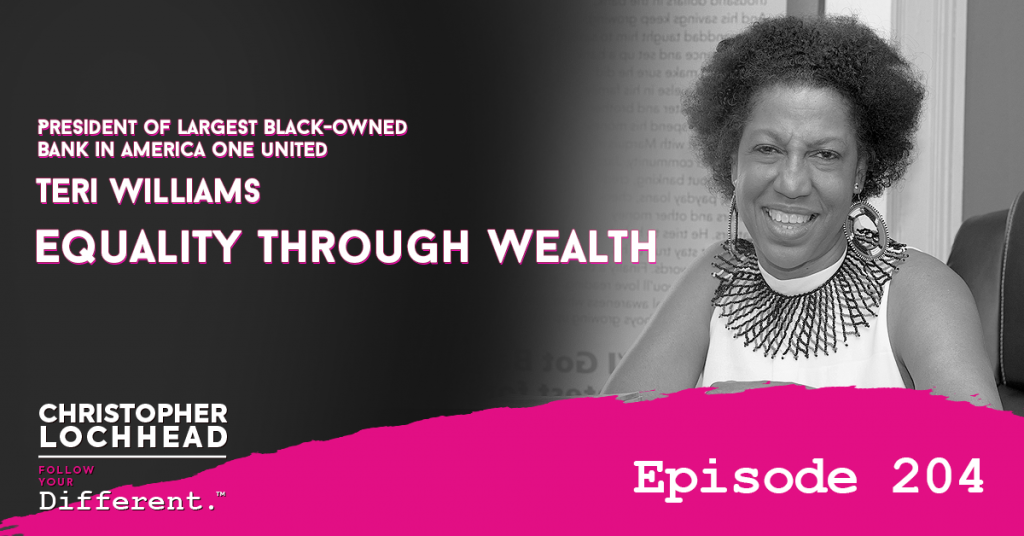
Podcast: Play in new window | Download (Duration: 1:18:52 — 54.2MB) | Embed
Subscribe: Apple Podcasts | Spotify | Pandora | RSS | More
Teri Williams is the legendary President and Chief Operating Officer of OneUnited Bank. She is helping transform the country with the empire she is currently building. From purchasing a small struggling community bank in Boston to creating OneUnited Bank, the largest black-owned bank in the United States of America. Since they have started, Teri and her husband, Kevin, with their team have made over $1 billion in loans together. Along with being an entrepreneur, she is also an author with her book, I Got Bank!: What My Granddad Taught Me About Money. Today, we have a powerful conversation about OneUnited Bank’s mission and how the couple runs a successful powerful business while raising two wonderful children. Teri has some fascinating insights on what it really means to make money and the statistics of the black community in the financial system. We also talk about how Teri and Kevin are showing how banking and entrepreneurship can change lives, communities, and even a country.The OneUnitedBank
OneUnited Bank is the largest black-owned bank in the country. It has not only started as a community but is also transforming to becoming a digital bank. The goal they have is to make financial literacy a core value in the black community. Teri gives a bit of her personal background and story, and how she learned business from her grandmother. She shares how one of the important things for the black community is to recognize those individuals who have been there, eliminate the carried shame, and value one’s experiences.“We’re finding ourselves not being able to speak in our authentic voice. We’re finding that our community is not listening to us because we’re not speaking in our authentic voice. So we have changed our communication. It was important for us, as a bank, to speak to the challenges that our community faces, not to run away from them. From that came this bank black movement. It is a bank black movement where black people can speak how they are going to move their money to black owned banks and are going to support black businesses.” – Teri Williams
Black Communities in the Financial System
Teri discusses the statistics and the poor treatment of the black community in the financial system. She shares how the homeownership rate in the black community is 30 percent lower compared to the white community. The number of loans and mortgages from national banks is 1 to 2 percent of all mortgages that are given to black families. Though, there is hope. OneUnited Banks is creating partnerships and transacting with big corporations that are currently making big differences to the community.“Netflix was the first to come out with this. Because of corporations like them, a lot of corporations have followed. I think the corporations realize that this is a way to contribute to what these banks are trying to do. It’s also important for people to know what we do. Over 70% of our lending actually goes into the community and our credit losses are almost zero. It’s not like we’re doing lending that is risky. We are just doing lending that isn’t being done by other institutions. That lending is giving our community an opportunity to build well.” – Teri Williams
OneTransaction Campaign and Conference
For Black History Month, Teri shares the OneTransaction Campaign and Conference that will be held on Juneteenth (June 19, 2021) from 1:00 – 6:00 PM ET (Eastern Time). The campaign will be a free virtual conference encouraging the black community to focus on one transaction in 2021. It will be filled with amazing speakers who are passionate to educate the community on how they can create generational wealth and close the racial wealth gap. We hope you can virtually join and register for the OneTransaction Campaign and Conference and be part of the conversation.“We give them a choice of six transactions. It could be a will, life insurance, home ownership, having a profitable business, improving their credit score or savings, and investments. We ask them to select one of those six transactions and then we provide them with action steps to accomplish that in 2021. We’re having this conference on Juneteenth which is an African-American holiday. We want to really educate the community on how they can build wealth.” – Teri WilliamsTo know more about Teri Williams and the amazing work her and husband are doing at OneUnited Bank, download and listen to this episode.
Bio:
Teri Williams is President and Chief Operating Officer of OneUnited Bank. She is responsible for the implementation of the Bank’s strategic initiatives, as well as the day-to-day operations of the bank. These operational areas include all retail branches, marketing, compliance, lending, information technology, customer support, legal, and human resources. Under her leadership, OneUnited Bank has consolidated the local names and product offerings of four (4) banks to create a powerful national brand supported by innovative products and services. She believes the financial services industry has not connected with urban communities to fully support economic development and wealth building. OneUnited Bank can serve as a bridge by offering affordable financial services for all and financial workshops. She brings 30 years of financial services expertise from premier institutions such as Bank of America and American Express, where she was one of the youngest Vice Presidents. Ms. Williams holds an M.B.A. with honors from Harvard University and a B.A. with distinctions from Brown University. She has served as Treasurer of Dimock Community Health Center in Roxbury, MA for over 5 years. She currently serves on the Boards of the Black Economic Council of Massachusetts (BECMA) where she serves as Treasurer and the 79th Street Corridor Initiative in Miami Florida. Ms. Williams is the author of I Got Bank! What My Granddad Taught Me About Money (Beckham Publishing) a financial literacy book for urban youth. Ms. Williams has received numerous notations and awards for her contribution to urban communities including from the Urban League, NAACP, and the National Black MBA Association.Links:
OneUnited Management Why OneUnited Amazon Books: I Got Bank!: What My Granddad Taught Me About Money Justice Deposits: How NetFlix, Twitter & Costco Are Leading Conscious Capital & You Can Too We hope you enjoyed this episode of Follow Your Different™! Christopher loves hearing from his listeners. Feel free to email him, connect on Facebook, Twitter, Instagram, and subscribe on iTunes203 How To Be A Bootstrap Entrepreneur On A Mission w/ Thousand Helmets CEO Gloria Hwang
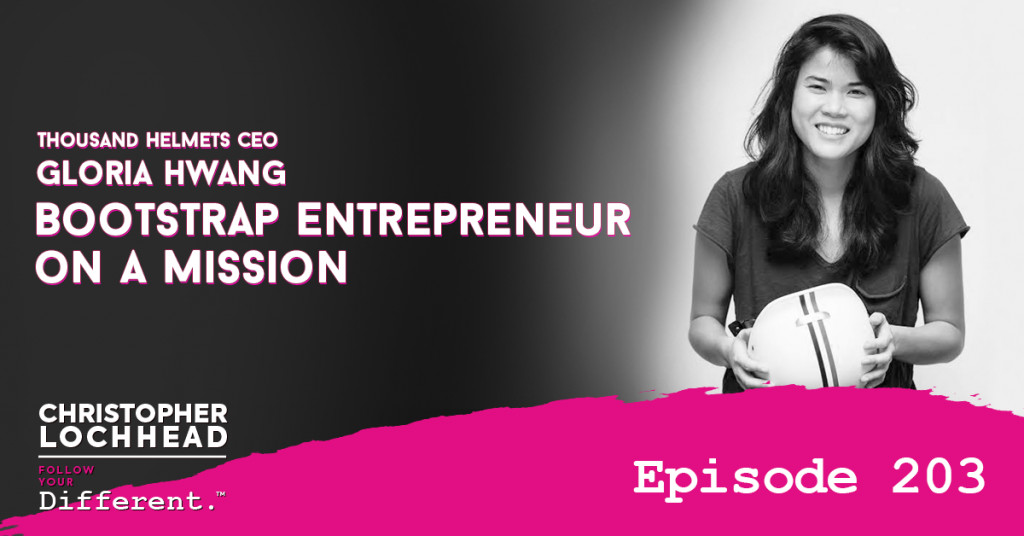
Podcast: Play in new window | Download (Duration: 1:21:08 — 55.7MB) | Embed
Subscribe: Apple Podcasts | Spotify | Pandora | RSS | More
Gloria Hwang was a long-time cyclist who never wore a helmet. She thought they were too bulky, inconvenient, and space-agey looking. Then, a friend of hers died in a bike accident. She decided something had to be done about helmets. Gloria, a savvy professional who’s been working for five years inside the legendary Tom’s shoes, saw the new mobility category designed right in front of her eyes.
With a very small amount of money and a Kickstarter campaign, she started Thousand Helmets. In this episode, we talk about Gloria’s story, as an entrepreneur and category designer and her mission of saving lives.
The Mission of Thousand Helmets
When Gloria decided to buy a helmet for herself, she saw a bunch of passable-looking helmets, but there’s nothing she wanted to wear. The number one reason people don’t ride a bike, skateboard, or scooter is they just don’t feel safe. So, she believed that making a helmet that people would want to wear could help save a lot of lives:
“I really believe that I can create a product that people want to wear and I could solve a lot of problems. They could help save lives, and I could get people moving around cities in a different way.” – Gloria Hwang
Prioritizing the Customer’s Perspective
As helmets have been around since forever, Christopher asks Gloria how she saw an opportunity to create a different category of helmets. She says that it was all about customer insight as she was once a customer. Their first products were based on a human-centered design perspective and not on a market perspective.
“As a consumer, you have a whole different set of customer needs and problems than what’s on the shelves. Then you kind of know that there is something out there for you that needs to be created.” – Gloria Hwang
Design Philosophy
Gloria shares the fundamental concepts in their product development process. The first one is style, and the second one is safety so that people can be safe and look stylish at the same time. The last one is convenience, which created the idea of their secret PopLock function to avoid theft when people leave their helmets behind.
“There’s the execution where things need to be beautiful and high quality, but it always goes back down to what the customer would be thinking right now and what problem they encounter when they’re deciding to pick up a helmet. So, at the end of the day, it’s kind of trying to get a good understanding of what that customer wants.” – Gloria Hwang
To know more about Gloria Hwang and how to be a bootstrap entrepreneur, download and listen to this episode.
Links:
Designer Spotlight: Thousand Bike Helmets Become A Stylish Safety Accessory
We hope you enjoyed this episode of Follow Your Different™! Christopher loves hearing from his listeners. Feel free to email him, connect on Facebook, Twitter, Instagram, and subscribe on iTunes
202 Harvard’s Top Astronomer Says Aliens Tried to Contact Us | Dr. Avi Loeb, Author, Extraterrestrial: The First Sign of Intelligent Life Beyond Earth
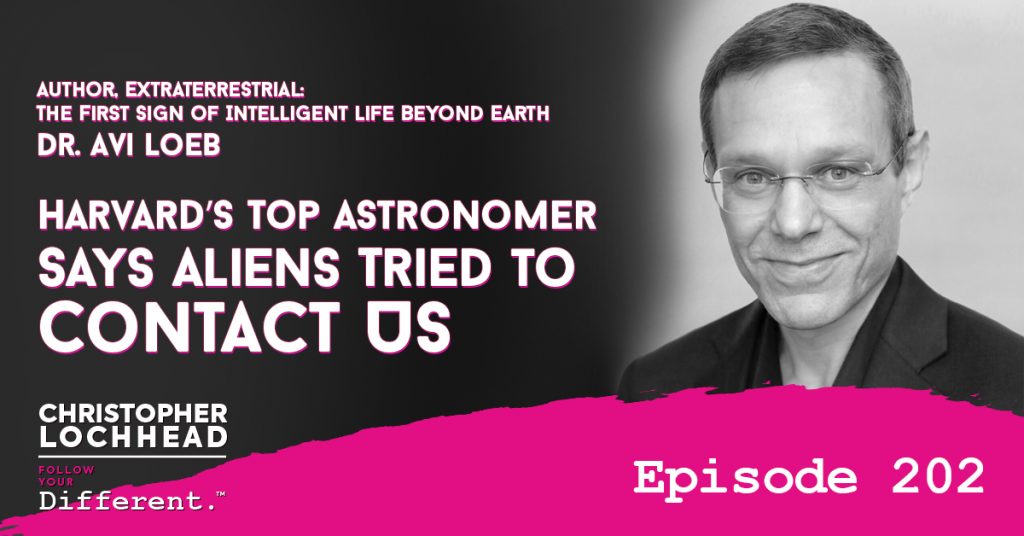
Podcast: Play in new window | Download (Duration: 1:26:58 — 59.7MB) | Embed
Subscribe: Apple Podcasts | Spotify | Pandora | RSS | More
Harvard’s top astronomer professor Avi Loeb, just published a book called Extra-Terrestrial, The First Sign Of Intelligent Life Beyond Earth. He believes that in 2017, the highly unusual object that passed by earth called Oumuamua, was likely alien.
So in this episode, we go deep into obvious hypotheses, the attributes and characteristics that prove that Oumuamua was not a comet or an asteroid or anything else we’ve seen before. We also dig into why the good professor thinks it was likely alien. We discuss why he thinks science is a “dialogue with nature” and why at massive personal risk, he decided to come forward with his theory.
Science as a Dialogue with Nature
Avi says that science is a way of appreciating and understanding the world. It is not in conflict with religion either. Science explains how things work and it increases your own understanding of nature. Additionally, he says that he’s frustrated because many scientists focus on concepts without evidence and have no connection to experiments:
“There is no evidence that these ideas are valued and that they actually describe nature. To me, that’s a betrayal of traditional physics, where we were supposed to have a dialogue with nature, not a monologue. We’re not supposed to tell nature what it is but listen for experiments to what nature is.” – Avi Loeb
The Discovery of Oumuamua
Christopher and Avi talk all about the likely alien, Oumuamua. Avi says that before discovering Oumuamua, they haven’t seen an object in outer space that moves too fast and more powerful from the gravitational pull. This ability to escape the gravitational pull of the sun was a huge discovery and led to the idea that an alien passed by the Earth for a visit.
“It’s just that it’s relative speed. If a bullet moves too fast relative to the earth or, if a spacecraft moves too fast, it will never fall. It would just escape. So the issue is how fast does an object move relative to the source of gravity? All the objects we have seen before were bound to the sun that was relics from the formation process of the solar system.” – Avi Loeb
Claims About Oumuamua
After discovering Oumuamua, astronomers claimed that it was just a comet or an asteroid that came near the Earth. Another object with an extra push similar to Oumuamua’s was also discovered. However, it turns out it was a rocket booster that left the Arabs in 1966. This event somehow proved that Oumuamua is indeed peculiar.
“The actual discovery of Oumuamua is by itself a puzzle. It means that the abundance of such objects is much greater than would be expected from the rocks that occupied the solar system at any event. Putting that aside, this object was peculiar. It exhibited an extra push of the type that you expect from a comet.” – Avi Loeb
To know more about Harvard’s Top Astronomer and the Aliens Who Tried to Contact Us, download and listen to this episode.
Bio:
Abraham (Avi) Loeb is the Frank B. Baird, Jr., Professor of Science at Harvard University.
He received a Ph.D. in Physics from the Hebrew University of Jerusalem in Israel at age 24 (1980-1986), led the first international project supported by the Strategic Defense Initiative (1983-1988), and was subsequently a long-term member of the Institute for Advanced Study at Princeton (1988-1993).
Loeb has written 8 books. These includes most recently, Extraterrestrial (Houghton Mifflin Harcourt, 2021), and about 800 papers (with an h-index of 113) on a wide range of topics. Topics include black holes, the first stars, the search for extraterrestrial life and the future of the Universe.
He had been the longest-serving Chair of Harvard’s Department of Astronomy (2011-2020), Founding Director of Harvard’s Black Hole Initiative (2016-present), and Director of the Institute for Theory and Computation (2007-present) within the Harvard-Smithsonian Center for Astrophysics.
He is the Chair of the Board on Physics and Astronomy of the National Academies (2018-present). Additionally, he is also an elected fellow of the American Academy of Arts & Sciences, the American Physical Society, and the International Academy of Astronautics.
Loeb is a member of the President’s Council of Advisors on Science and Technology (PCAST) at the White House and a member of the Advisory Board for “Einstein: Visualize the Impossible” of the Hebrew University.
He also chairs the Advisory Committee for the Breakthrough Starshot Initiative (2016-present). Further, he serves as the Science Theory Director for all Initiatives of the Breakthrough Prize Foundation.
In 2012, TIME magazine selected Loeb as one of the 25 most influential people in space. In 2020 Loeb was selected among the 14 most inspiring Israelis of the last decade.
Click here for Loeb’s commentaries on innovation and diversity.
Links:
Amazon Books – Extraterrestrial: The First Sign of Intelligent Life Beyond Earth
Harvard’s Top Astronomer Believes Aliens Tried to Contact Us in 2017
A Harvard professor says an alien visited in 2017 — and more are coming
We hope you enjoyed this episode of Follow Your Different™! Christopher loves hearing from his listeners. Feel free to email him, connect on Facebook, Twitter, Instagram, and subscribe on iTunes
201 The Art of The Impossible w/ Steven Kotler NY Times Bestselling Author
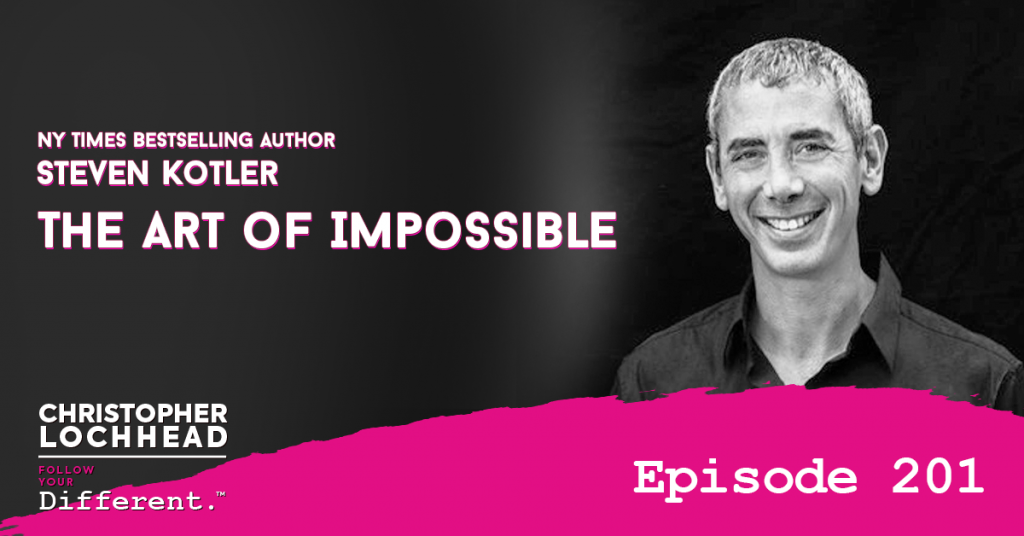
Podcast: Play in new window | Download (Duration: 1:22:00 — 56.3MB) | Embed
Subscribe: Apple Podcasts | Spotify | Pandora | RSS | More
Today, we have the legendary Steven Kotler to talk about how we can turn the impossible into possible, using insights from his book, The Art of Impossible. The book is about peak performance and it aims to teach us how to stretch far beyond our capabilities to attain our dreams and anything we want.
Personality vs. Biology
Steven states that in the field of peak performance, personality doesn’t scale because biology does. Personality is composed of traits that are immutable and locked in. He also describes neurobiology as a mechanism of brain work.
“If you try to figure out what works for me and use it to train you and if you’re not exactly the same kind of person I am with the same personality traits, this is not going to work. But underneath that one level down, there is a level of biology. A way the system has been designed to work, and that is the part that we all share. The stuff that evolution designed for all of us to share.” – Steven Kotler
Focus Comes with Motivation
Steven says that you always have to focus on what you pay attention to, or what you ignore. Curiosity, passion, purpose, and autonomy are designed to work in a specific sequence, but all of them give us focus for free. He also says that the whole point about biology and the human system is you get farther and faster with less work.
“We are hardwired for the extraordinary. It is one of the surprising things about being human that most people don’t realize. To take it a step farther, not going big, is actually bad for us. That’s an equally important point here.” – Steven Kotler
Turning Anxiety into Excitement
Today, we live in a world filled with probabilistic threats, which is the reason why most people have anxiety. Steven concludes that the brain doesn’t turn off until the danger is gone completely. So, you have to take steps to calm nervous system down because it won’t shut down on its own:
“Most humans can feel curiosity and anxiety at the same time. Talk about reframe and cognitive reframing, a technique for turning anxiety into excitement. Because it’s the same chemical and it’s very easy to do. An example of giving biology to work for you rather than against you. We’re plagued by anxiety, and yet we’re hardwired to turn anxiety into excitement very easily just with the right tools.” – Steven Kotler
To know more about the art of the impossible with Steven Kotler, download and listen to this episode.
Bio:
Steven Kotler is a New York Times bestselling author, an award-winning journalist, and the Executive Director of the Flow Research Collective. He is one of the world’s leading experts on human performance.
He is the author of nine bestsellers (out of thirteen books), including The Art of Impossible, The Future is Faster Than You Think, Stealing Fire, The Rise of Superman, Bold, and Abundance.
His work has been nominated for two Pulitzer Prizes, translated into over 40 languages, and has appeared in over 100 publications, including the New York Times Magazine, Wired, Atlantic Monthly, Wall Street Journal, TIME, and the Harvard Business Review.
Links:
We hope you enjoyed this episode of Follow Your Different™! Christopher loves hearing from his listeners. Feel free to email him, connect on Facebook, Twitter, Instagram, and subscribe on iTunes
200 Ministry of Common Sense w/ Martin Lindstrom
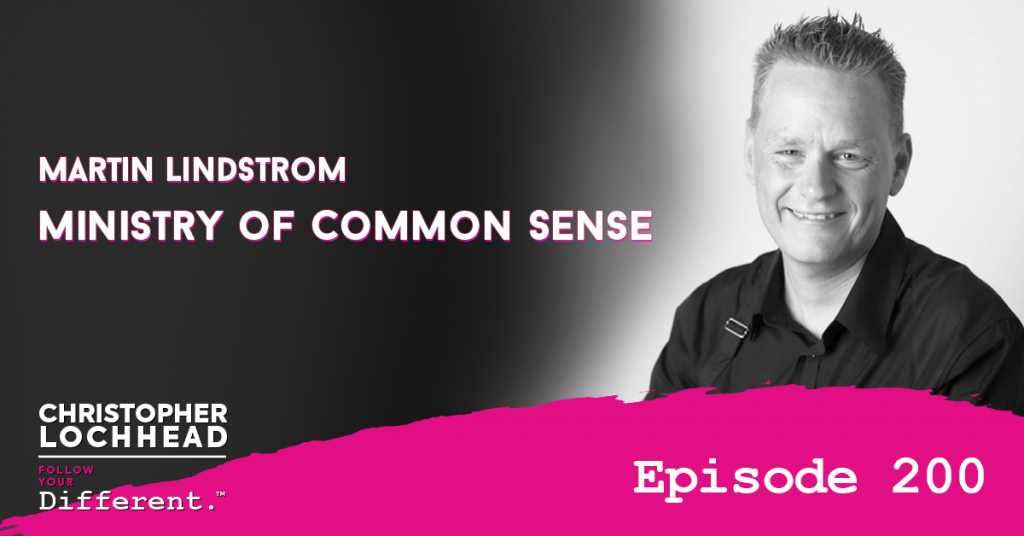
Podcast: Play in new window | Download (Duration: 1:20:34 — 55.3MB) | Embed
Subscribe: Apple Podcasts | Spotify | Pandora | RSS | More
Our guest today is Martin Lindstrom, best-selling author and branding and culture guru. Time Magazine calls him one of the 100 World’s Most Influential People. He’s got an important and timely, brand new book out called The Ministry of Common Sense: How To Eliminate Bureaucratic Red Tape, Bad Excuses And Corporate Bullshit.
We have a captivating conversation and Martin sheds light on some very eye opening ideas, like why empathy is dying and what we can do about it, why common sense has eroded and what we can do about that too. There’s going to be fascinating things like how Botox is hurting the relationships between mothers and babies, why Netflix has a bizarre hugging policy, the impact of women driving in Saudi Arabia and a lot more.
Listen closely for Martin’s theory on why some people get a lot more opportunities in life than others. It’s quite fascinating.
The Impact of Women Driving In Saudi Arabia
Martin shares his travels in Saudi Arabia and how the country is transforming in a historic moment. He discusses how he helped bring driving schools to Saudi Arabia. This elevation of women’s freedom brought him a different kind of purpose.
“For you and I, it sounds like an ordinary thing, but in Saudi Arabia it has never existed before. My driver was a woman. It was the second time she’s been out driving. She was almost shaking because she was so excited about being liberated. So it’s just amazing and such a warm hearted experience to see how these suppressed women are suddenly getting freedom.” – Martin Lindstrom
Empathy is Dying
The thing that everyone is missing in the world is empathy. Martin discusses factors such as the use of phones, the absence of observation, and the “easiness” of social apps has contributed to the lack of empathy.
“There was a study done recently showing that the degree of empathy among more than 10,000 students in the US have dropped around 50% over the last decade. The reason why it’s disappearing is not just because of the smart phones, where we don’t look at each other during meals, but also because we no longer observe.” – Martin Lindstrom
Common Sense Has Eroded
Martin points out that along with empathy, the world seems to have lost its common sense. He explains that when he refers to common sense eroding, he meant that no one questions things at all. This is because people have become so attached to becoming politically correct in every aspect that they no longer dare see things anymore as they are.
“One of the things that are disappearing out of our society, along with empathy, is the lack of common sense. There is no common sense in our society at all. Common sense is first of all, like muscle memory. You have to train it and in turn it becomes stronger. If you don’t use it, it becomes weaker and guess what? It’s incredibly weak at the moment because remember by empathy, I say you put yourself in the shoes of another person. That’s really common sense because sometimes you actually have to look at things from a different point of view, exactly as if you’ve experienced it with your own eyes. – Martin Lindstrom
To know more about Martin Lindstrom and hear more about his fantastic book and theories on life, download and listen to this episode.
Bio:
Martin Lindstrom is the founder and chairman of Lindstrom Company, the world’s leading brand & culture transformation group, operating across five continents and more than 30 countries.
TIME Magazine has named Lindstrom one of the “World’s 100 Most Influential People”. And for three years running, Thinkers50, the world’s premier ranking resource of business icons, has selected Lindstrom to be among the world’s top 50 business thinkers.
Lindstrom is a high profile speaker and author of 7 New York Times best-selling books, translated into 60 languages.
His book Brand Sense was critically acclaimed by The Wall Street Journal as “one of the five best marketing books ever published”, Small Data was praised as “revolutionary” and TIME Magazine wrote this about Buyology: “a breakthrough in branding”.
Links:
Website: Martin Linkdstrom
Book: The Ministry of Common Sense: How to Eliminate Bureaucratic Red Tape, Bad Excuses, and Corporate BS
We hope you enjoyed this episode of Follow Your Different™! Christopher loves hearing from his listeners. Feel free to email him, connect on Facebook, Twitter, Instagram, and subscribe on iTunes!
199 How to Redesign Your Life w/ Eric Jorgensen
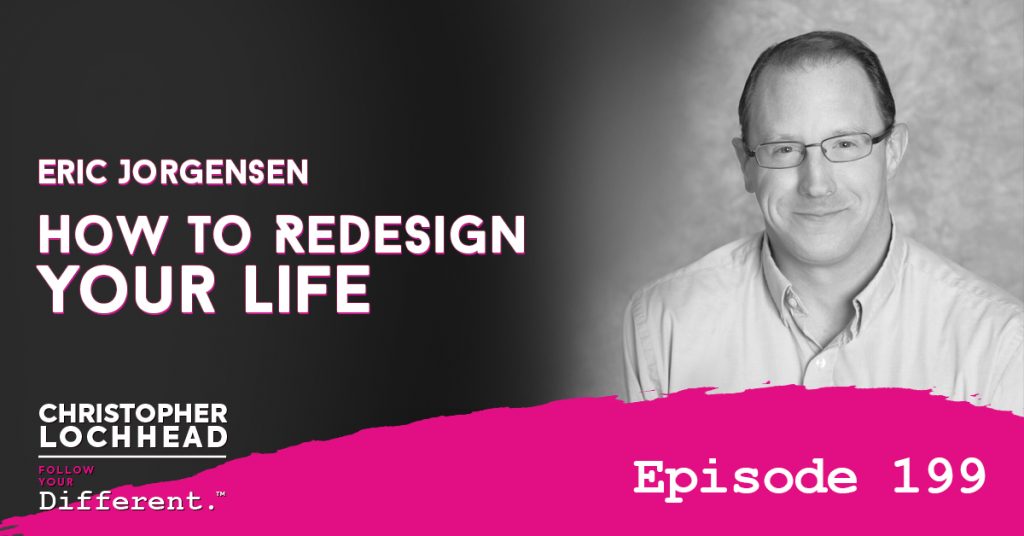
Podcast: Play in new window | Download (Duration: 1:11:44 — 49.3MB) | Embed
Subscribe: Apple Podcasts | Spotify | Pandora | RSS | More
At the moment, there is a big rise in “diseases of despair.” These are things like substance abuse, alcohol dependency, suicidal thoughts and behaviors. As a matter of fact, according to the medical journal BMJ, diseases of despair have soared in the United States over the past decade, rising 68% between 2009 and 2018. The study also shows suicidal thoughts and behaviors were up 70%. And all of that was of course before COVID.
However, despair doesn’t have to mean defeat. Our guest today, Eric Jorgensen is an extraordinary man. His son, William was born with significant disabilities. What you’re about to hear is the extraordinary tale of how Eric’s life turned to tragedy, the horrible suffering that he endured and the painful events of Eric and William’s life. You’ll also hear how this real American hero transformed, unbearable despair into triumph.
Road to Healing
Life often throws us whirlwinds of challenges, tragedy, and sometimes even despair. Eric shares his tale of how he has withstood the hardships of having cancer and taking care of his son with significant disabilities. He shares his extraordinary story of recovery, all the while dealing with the global pandemic, Covid-19.
“When I found out it was grade IIA cancer. I guess in the scheme of things, I was somewhere in the middle. I didn’t need chemo. I didn’t need radiation. In terms of recovery, I got really lucky. It was just a matter of taking care of my wound and letting it heal…In regard to COVID, alI I could think about is holy crap. It was scary. If I get sick, on top of cancer, and I can’t help my son out on his day to day stuff, what’s going to happen. Who’s going to do that for me?” – Eric Jorgensen
Channel Your Anger
The ability to appropriately express and channel one’s anger is one of the most important things about being human. Eric discusses how his anger, while not always constructive, was the driving force for him to start his own company. Rising through all this frustration and anger, it was able to lead him into where he is now.
“I was getting frustrated because what I was being asked to do, wasn’t what I wanted to do. It wasn’t helping the people I wanted to help. It wasn’t addressing the need I thought it needed to be filled… Now that I started my company ,I get to help families who are where I was eight years ago. Not knowing what to do and I’m catching them before they get there.” – Eric Jorgensen
Know You’re Not Alone
Eric shares his big learnings as he looks back over the last eight years of his life and how he has navigated through his challenges. One of the things he wants people to remember is that don’t try and do everything alone. Everyone is strong but oftentimes, one needs someone they can lean on and trust.
“I kept it balled in and then it would shockingly blow up at the worst possible time. I would take it out on people that I had absolutely no reason for me to take it out on. So try to build a team or a tribe or whatever you call it. Try to build a group of people. I keep my circle pretty small. Get a couple of really tight people that you can really really trust.” – Eric Jorgensen
To know more how to redesign your life with Eric Jorgensen, download and listen to this episode.
Bio:
Eric has been helping families with intellectual and developmental disabilities since his retirement from the Navy in 2012.
He was widowed the same year he retired.
At the time his 12 y/o autistic son, William, was completely dependent on his wife for everything.
It was his frustration with the difficulty of figuring out what to do and navigating services for his son which led him to found Special Needs Navigator.
Eric created the category of Special Needs Planning to help families, individuals and caregivers connect the dots when working with attorneys, financial advisors, and other professionals.
His specialty is helping them identify what they don’t know and provide clarity. He works with his clients around the country to develop individualized solutions best suited to their circumstances.
In addition to working with clients one on one; Special Needs Navigator has a blog, YouTube channel and podcast. Eric uses the blog to do a deep dive every week into subjects like ABLE accounts, Special Needs Trusts and other topics families frequently have questions about.
The podcast and YouTube channel focus on benefits, resources and services families may not know, or want to learn more, about.
Links:
Website: Special Needs Navigator
Podcast: ABC’s of Disability Planning
Facebook: @SpecNeedsNav
Twitter: @NeedsNavigator
A New Study Found ‘Deaths Of Despair’ Soared Over The Past Decade
We hope you enjoyed this episode of Follow Your Different™! Christopher loves hearing from his listeners. Feel free to email him, connect on Facebook, Twitter, Instagram, and subscribe on iTunes!

